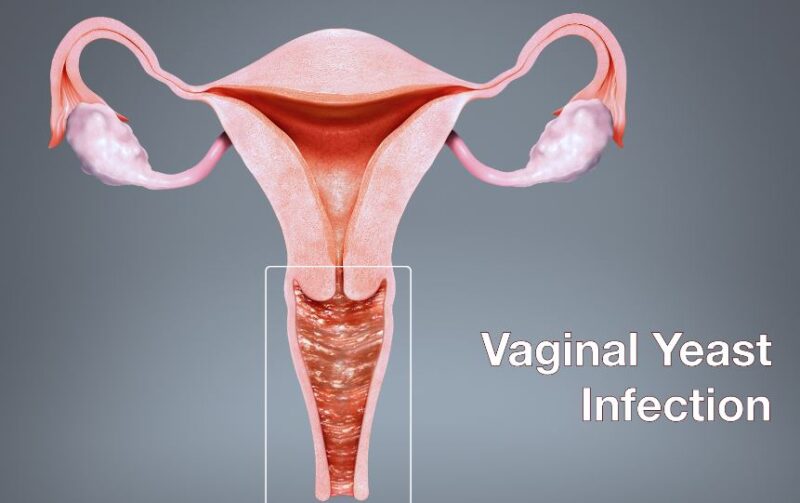Do you often experience itchiness, irritation, and uncomfortable discharge from your vagina? You can probably be at risk of yeast infection or vaginal candidiasis. It is one of the most common infections affecting women around the globe. It affects the tissues at the vaginal opening causing distress and irritation around the area. With correct home remedies and medications, you can shield yourself from its further effects.
Curious to know more about it? Do not worry as we are going to discuss everything on yeast infections including yeast infection symptoms, causes, and treatment in this article.
What Are Yeast Infections?
Vaginal candidiasis or yeast infection is a common fungal infection affecting the vulva of the vagina. This fungus usually germinates on the skin, gastrointestinal tracts, mouth, and genitals. The sudden, uncontrollable multiplication of fungus under certain circumstances can result in yeast infections. It affects three out of four people with a vagina at some point of time in the course of their life. Though it isn’t considered a sexually transmitted infection, there’s a high risk of infection during first regular sexual activity.
What Are The Common Yeast Infection Symptoms?
Yeast infections are divided into two types- mild or moderate and complicated yeast infections. Mild or moderate yeast infection symptoms include:
- Vulva/Vaginal irritation and itching
- Burning sensation during sexual intercourse or urination
- Redness around the area
- Swelling of vulva
- Pain and discomfort
- Rashes
- Vaginal discharge (usually white-colored, watery, or thick substance resembling the texture of cottage cheese)
The untreated or persistent mild infections can result in causing complicated yeast infections. It is caused by an atypical kind of fungus. People who are pregnant or have high-diabetes issues are at a high risk of contracting complicated yeast infections. You may have a complicated yeast infection if you experience:
- Cracks, tears, or sores as a result of extensive itchiness
- Persistent redness and swelling of vaginal tissue
- Four or more infections in a year
- Weak immunity
Yeast Infection Causes:
Yeast infections are usually caused by the fungus ‘Candida Albicans’, a naturally occurring yeast in the vagina. The presence of Lactobacillus keeps a check on the growth of such yeast in the vaginal area.
But, these bacteria can lose their effectiveness over time due to imbalance. This roots the cause of the overgrowth of fungus in the vagina and gives rise to signs and symptoms of yeast infections. Factors that increase risk and contribute to yeast infection causes are:
● Use of Antibiotics:
Intake of antibiotics to treat any other bacterial infections of the vagina are at a high risk of yeast infection. This is because these medications tend to limit the effectiveness of the bacteria responsible for checking the overgrowth of fungus. Thereby, leading to an overgrowth of fungus.
● Pregnancy:
Pregnancy can lead to certain hormonal imbalances or changes in the body. It can contribute to the multiplication of the fungus in the vagina.
● High Blood-Sugar Level:
According to some information, women with increased blood sugar levels are at a higher risk of yeast infection than those with normal blood sugar levels.
● Weak Immunity:
Weak immunity can lead to imbalance, hereafter, promoting the overgrowth of fungus.
● High Estrogen Level:
Women having an increased estrogen level because of birth control pills or hormone therapy are at a higher risk of yeast infection than others.
The fungus can be treated easily with some over-the-counter medication, home remedies, and healthy vaginal habits. But, if you frequently experience yeast infections or have trouble curing it, the other Candida might be the reason. Consult with your healthcare professional as these can be a little daunting sometimes.
Treatment Of Yeast Infection:
Mild or Moderate yeast infections can be treated easily with some over-the-counter medication. Some home remedies and healthy vaginal habits can help prevent future occurrences. Some commonly prescribed yeast infection treatment pills are Miconazole (Monistat), Fluconazole (Diflucan), Terconazole (Terazol), Butoconazole (Gynazole), and others.
For the treatment of complicated yeast infections, doctors can prescribe some yeast infection medicine, ointments, and creams. Strictly follow up with the medications to avoid adversities.
Are There Any Home Remedies For Yeast Infection?
Home remedies are an easy way to cure disease by the use of natural, easily available resources. There are such remedies for the treatment of yeast infection too. The ingredients include Boric acid, coconut oil, tea tree oil, and yogurt. Always wash/clean your hands before applying any creams or oils to your vagina. Consult or talk to your doctor before combining home remedies with yeast infection medicine.
How To Prevent Yeast Infection?
A lot of people have been struggling with the question of how to prevent yeast infection lately. To make sure that these infections do not bother you, again and again, follow these tips:
- Prevent from wearing tight-fitting lowers including pants, leggings, pantyhose, or tights.
- Avoid the use of fragrant feminine products such as bathing balls, pads, or tampons.
- Do not take frequent hot baths and avoid sitting in hot tubs.
- Douching
- Make sure you don’t stay in wet clothing for a long period.
- Eat yogurt.
- Wear cotton or silk underwear.
- Lastly, eating a balanced diet.
Final Words:
Yeast Infection is a common fungal infection affecting the vulva of the vagina. It can be cured easily with some over-the-counter medicines and ointments. Consult with your healthcare professional if the symptoms persist for more than two months. Follow the prevention tips for aiding forthcoming occurrences.










